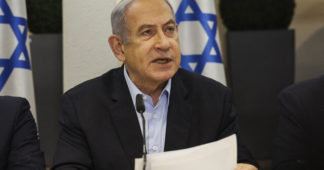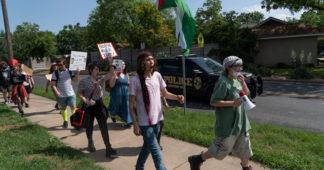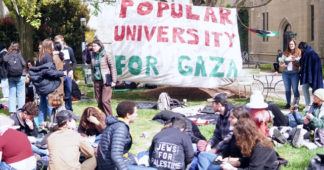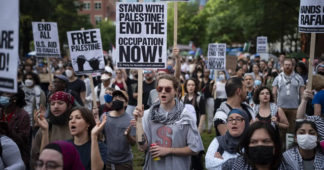As the Gaza war rages, Israeli funds target US college campuses and push to redefine antisemitism in US law
By Lee Fang and Jack Poulson
Jun 24, 2024
Last November, just weeks into the war in Gaza, Amichai Chikli, a brash, 42-year-old Likud minister in the Israeli government, was called into the Knesset, Israel’s parliament, to brief lawmakers on what could be done about rising anti-war protests from young people across the United States, especially at elite universities.
“I’ve said it before, and I’ll say it again now, that I think we should, especially in the United States, be on the offensive,” argued Chikli.
Chikli has since led a targeted push to counter critics of Israel. The Guardian has uncovered evidence showing how Israel has relaunched a controversial entity as part of a broader public relations campaign to target US college campuses and redefine antisemitism in US law.
Seconds after a smoke alarm subsided during the hearing, Chikli assured the lawmakers that there was new money in the budget for a pushback campaign, which was separate from more traditional public relations and paid advertising content produced by the government. It included 80 programs already under way for advocacy efforts “to be done in the ‘Concert’ way”, he said.
The “Concert” remark referred to a sprawling relaunch of a controversial Israeli government program initially known as Kela Shlomo, designed to carry out what Israel called “mass consciousness activities” targeted largely at the US and Europe. Concert, now known as Voices of Israel, previously worked with groups spearheading a campaign to pass so-called “anti-BDS” state laws that penalize Americans for engaging in boycotts or other non-violent protests of Israel.
Its latest incarnation is part of a hardline and sometimes covert operation by the Israeli government to strike back at student protests, human rights organizations and other voices of dissent.
Voices’ latest activities were conducted through non-profits and other entities that often do not disclose donor information. From October through May, Chikli has overseen at least 32m shekels, or about $8.6m, spent on government advocacy to reframe the public debate.
It didn’t take long for one of the American advocacy groups closely coordinating with Chikli’s ministry, the Institute for the Study of Global Antisemitism and Policy, or ISGAP, to score a powerful victory.
In a widely viewed December congressional hearing on alleged antisemitism among student anti-war protesters, several House GOP lawmakers explicitly cited ISGAP research in their interrogations of university presidents. The hearing concluded with Representative Elise Stefanik’s viral confrontation with the then president of Harvard University, Claudine Gay, who later retired from her role after a wave of negative news coverage.
The ISGAP, which reportedly received the majority of its funding in 2018 from the Israeli agency that was running Concert, touted its congressional public relations coup at a 7 April event at the Palm Beach Country Club.
“All these hearings were the result of our report that all these universities, beginning from Harvard, are taking a lot of money from Qatar,” bragged Natan Sharansky, a former Israeli Knesset member (MK) who previously held Chikli’s role and now chairs the ISGAP. Sharansky told the assembled supporters that Stefanik’s remarks had been viewed by 1 billion people.
The ISGAP has continued to shape congressional investigations of universities over claims that protests over Israel’s human rights record are motivated by antisemitism, and the organization has been deeply involved in the campaign to enshrine new laws that redefine antisemitism to include certain forms of speech critical of the nation of Israel.
Other American groups tied to Voices have pursued a range of initiatives to bolster support for the state of Israel. One such group listed publicly as a partner, the National Black Empowerment Council (NBEC), published an open letter from Black Democratic politicians pledging solidarity with Israel. Another group, CyberWell, a pro-Israel anti-disinformation group led by former Israeli military intelligence and Voices officials, has established itself as an official “trusted partner” to TikTok and Meta, helping both social platforms screen and edit content. A recent CyberWell report called for Meta to suppress the popular slogan “From the river to the sea, Palestine will be free”.
The dawn of the Gaza war after the 7 October 2023 terror attacks by Hamas sparked the third reboot for the government-backed company, which was originally chartered through the now-downgraded ministry of strategic affairs. The revamp was first disclosed through a little-noticed budget document posted by the Israeli government on 1 November, which noted that Voices would be freezing all prior campaigns to support activities related to “winning the war over Israel’s story”.
The organization is now under the administration of Chikli, the Israeli minister for diaspora affairs.
Continue reading at www.theguardian.com
We remind our readers that publication of articles on our site does not mean that we agree with what is written. Our policy is to publish anything which we consider of interest, so as to assist our readers in forming their opinions. Sometimes we even publish articles with which we totally disagree, since we believe it is important for our readers to be informed on as wide a spectrum of views as possible.











